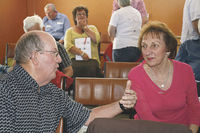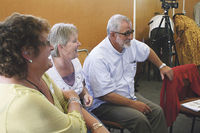My sister and I have a tumultuous relationship typical of many families. It seems the only way we can get on is to keep the Tasman Sea between us. When we are together there is often a difference of opinion which erupts into hurtful words.
Imagine my joy when, on her latest visit to her native land, we became like the sisters you read about in those American novels like Little Women by Louisa May Alcott – supportive and solicitous for the feelings of each other. There was the same degree of honesty but never a cross word.
 I thought of this transformation when listening to former psychotherapist Sr Catherine Shelton of Whanganui leading a workshop for archdiocesan clergy, lay pastoral leaders, Launch Out candidates and pastoral services staff last month on ‘Conflict with Compassion’.
I thought of this transformation when listening to former psychotherapist Sr Catherine Shelton of Whanganui leading a workshop for archdiocesan clergy, lay pastoral leaders, Launch Out candidates and pastoral services staff last month on ‘Conflict with Compassion’.
So often we lash out without thinking, later wishing we could tug the words back down our throats. Wait five minutes, Sr Catherine told a packed hall, then ask the other how they came to this point.
Conflict is good – it is part of the human condition. Most change for the good happens as a result of conflict. But there is good conflict and bad.
The key is to know where we stand on the issue of conflict and then to de-centre ourselves to focus on the other person. What are their needs? How did they arrive at this place?
Sr Catherine reminded participants of Henri Nouwen’s statement of the ‘enormous hunger for meaning in life, for comfort and consolation, for forgiveness and reconciliation, restoration and healing that anyone who has any authority in the church should constantly be reminded that the best word to characterise religious authority is compassion.’
Between people interraction always takes place but what is important is how that interraction happens.
‘Sometimes we have expectations of what might have been. It is important to agree and come together and see how things are going.
 Can we feel good about ourselves and the other, whether that person changes or not? The essence is to maintain connection.
Can we feel good about ourselves and the other, whether that person changes or not? The essence is to maintain connection.
‘The belief that we can change someone else is one of the biggest traps in conflict resolution.’ Maybe this was the problem – perhaps I was trying to change her.
But I realised through studying Eckhart Tolle’s The Power of Nowand A New Earth that all my anxieties and fears disappeared when I focused only on the present moment and tried to be totally present to myself and others. I was able to let go of petty differences and allow my sister to be herself in my presence. Conflicts diminish when we see others as the gift they are.
However, Sr Catherine did say that there are some conflicts one just has to walk away from, to agree to disagree and cut losses. This, she promised, is the subject of another workshop.
Sr Catherine is part of the Josephite community in Whanganui. They run spirituality workshops open to all. For more information, email ssjoseph@xtra.co.nz or 06 345 5047.
Images: Top Fr James Lyons with Barbara Rowley, lay pastoral leader in the Hutt Valley Pastoral Area; and bottom Launch Out graduates Eleanor Hautler and Sharon Penny with Fr Eddie Condra of St Mary’s, Carterton.